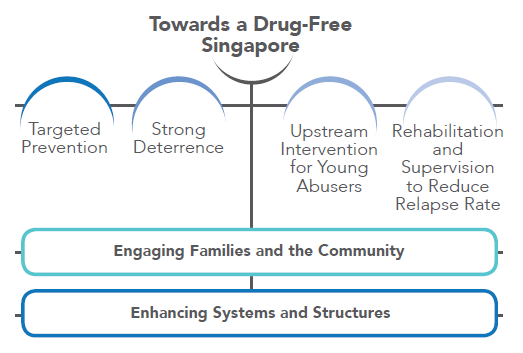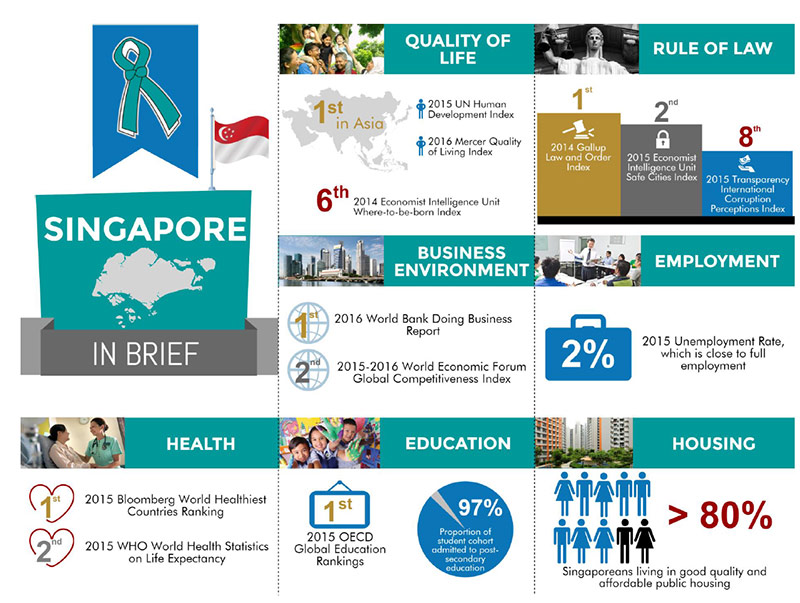Beware of fake/phishing SMS messages or emails that impersonate the Central Narcotics Bureau (CNB). CNB does not send clickable links in SMS messages. CNB officers will only send emails from addresses ending with “@cnb.gov.sg”. If in doubt, you may contact us via the official channels listed at https://www.cnb.gov.sg/contact-us
Singapore’s Preventive Drug Education Approach
Preventive Drug Education (PDE) is the first line of defence in Singapore’s overall drug control strategy. Singapore places a strong emphasis on the demand reduction of illicit drugs by educating youths on the dangers of drug dependence, and engaging community partners and the public to sustain a national consensus of zero tolerance on drug abuse. PDE efforts are led by the Central Narcotics Bureau (CNB), who works in tandem with the National Council against Drug Abuse (NCADA) to develop and implement PDE programmes based on surveys and research.

Singapore’s PDE approach is based on the theory of inoculation, wherein messages are focused on priming youths to understand the harmful effects of drugs, and urging them to resist the temptations to experiment when exposed to drugs. Our PDE efforts are centred on youths up to the age of 35, as these young minds are often the target of corruption by drug pushers.
Singapore aims to be comprehensive in our PDE outreach, starting from the youth’s immediate family, followed by the schools he attends and the community he lives within.
Family
Parents are equipped with handbooks that are available online to impart relevant knowledge on drug abuse symptoms, having conversations with youths, and fostering protective factors through family bonding and parental care. Parents Support Groups are also engaged through the schools to sensitise parents to growing drug trends and reminding them to remain vigilant.
Schools and other Youth Touch Points
Anti-substance abuse messages are embedded into primary and secondary curriculums, which encourage the cultivation of healthy lifestyle and the life skills needed to resist temptations to use drugs. These are supplemented with PDE programmes from CNB that include skits, activity booklets and sharing sessions by ex-drug abusers. PDE talks and roadshows are also held at Institutes of Higher Learning (IHLs) and National Service (NS) agencies to reinforce the messages at different phases of the youth’s life. Like parents, handbooks for educators and NS commanders are available for download, to assist them in their own PDE efforts.
Community
Singapore organises an annual high-profile Anti-Drug Abuse Campaign (ADAC) to garner and raise visibility of public support for a drug-free Singapore. The ADAC is normally held in the month of June to observe the International Day against Drug Abuse and Illicit Trafficking, which falls on 26 June.
Apart from high profile public events, CNB and NCADA also engage community partners to enlist influencers who help advocate against drug abuse in at-risk communities. The Singapore Prisons Service (SPS) also helps ex-drug abusers who are released from drug rehabilitation centres (DRCs) to reintegrate back to society through the Yellow Ribbon Community Project (YRCP), and mitigates the stigmatisation of such individuals.
The purpose of these events and initiatives is to build cohesive communities and collectively forge a strong national consensus for drug-free Singapore.
Society
While Singapore uses a variety of traditional and digital channels to spread the anti-drug message, we recognise that PDE programmes cannot exist in a vacuum. We do not assume that a youth will readily commit to stay drug-free after a PDE talk or programme. The conditions in society must facilitate a drug-free way of life. This is why different Government agencies and non-Government partners work together to ensure an active and meaningful lifestyle for our youths and the public, as well as to incorporate and enforce an integrated range of interventions and policies that are conducive in our fight against drugs.

The goal is to ensure that our society at large is conducive for our PDE efforts – a society in which drug activities are not part of the societal norms, nor tolerated at all. Singapore stands in solidarity with the rest of the Southeast Asian countries in building a drug-free ASEAN.
